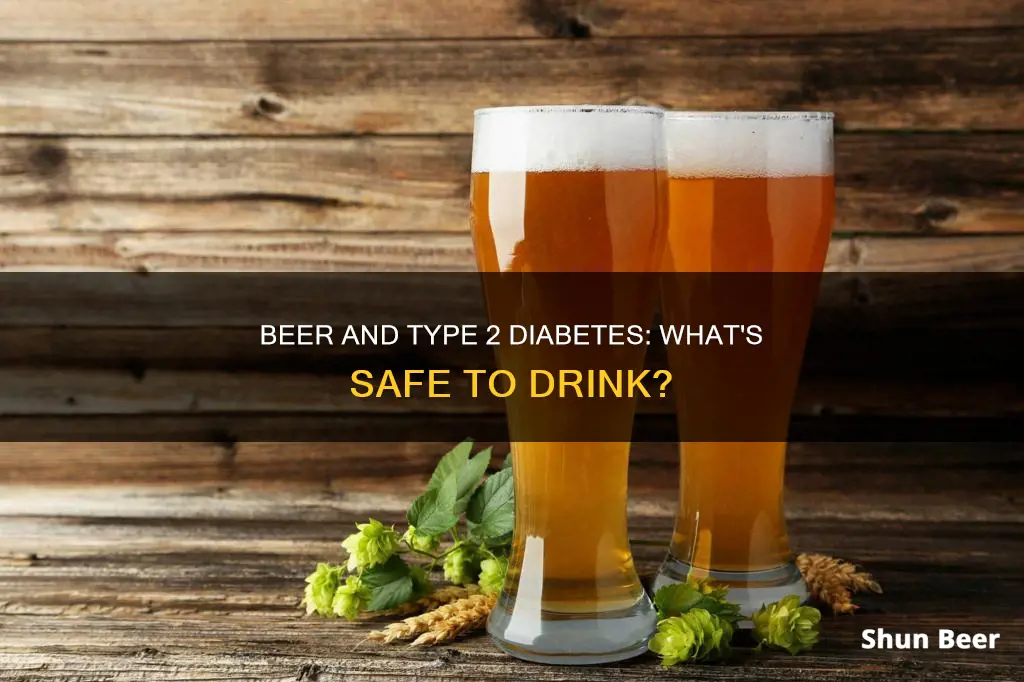
If you have type 2 diabetes, you may be wondering if it's safe to drink alcohol. The short answer is that it depends on various factors. Firstly, it's important to understand how alcohol affects your blood sugar levels. Alcohol can cause blood glucose levels to rise or fall, depending on how much you drink and whether you consume it with food. It interferes with the liver's ability to regulate blood sugar and can lead to hypoglycemia, especially if combined with certain diabetes medications. Therefore, it is crucial to consult your healthcare provider to understand the impact of alcohol on your specific condition and medication.
Other important considerations include the type and amount of alcohol consumed. Beer and sweet wine contain carbohydrates and may raise blood sugar levels. Additionally, alcoholic drinks are often high in calories, which can affect weight management. Excessive alcohol consumption is associated with an increased risk of type 2 diabetes and other health issues such as nerve damage, heart disease, and high blood pressure. Therefore, it is generally recommended to drink in moderation, following guidelines provided by health organizations.
In summary, while occasional drinking may be possible for people with type 2 diabetes, it is crucial to understand the risks and take necessary precautions, such as drinking with food, choosing low-carb and low-sugar options, and monitoring blood sugar levels before and after drinking. Consulting with a healthcare professional is essential to determine if drinking alcohol is safe and to develop a personalized plan for managing diabetes and alcohol consumption.
| Characteristics | Values |
|---|---|
| Can type 2 diabetics drink beer? | In most cases, people with type 2 diabetes can drink alcohol in moderate amounts. |
| How does alcohol affect blood sugar levels? | Alcohol can cause blood glucose levels to rise or fall, depending on how much you drink. |
| What is the recommended daily alcohol intake for men? | No more than two drinks per day. |
| What is the recommended daily alcohol intake for women? | No more than one drink per day. |
| What is considered a drink? | A drink equals 1.5 oz of liquor, 12 oz of beer, or 5 oz of wine. |
| What are the risks of drinking alcohol for type 2 diabetics? | Hypoglycemia, increased triglyceride levels, high blood pressure, nerve damage, weight gain, and interference with diabetes medications. |
| What are the benefits of drinking alcohol for type 2 diabetics? | May improve blood sugar control and reduce the risk of heart disease. |
| What are some general guidelines for drinking alcohol with type 2 diabetes? | Drink in moderation, choose low-sugar and low-carb beverages, drink with food, monitor blood sugar levels, and always wear a medical ID. |
What You'll Learn

Alcohol can cause hypoglycaemia
Drinking alcohol on an empty stomach or when blood sugar levels are already low increases the risk of experiencing hypoglycaemia. This is because drinking on an empty stomach makes it extremely difficult for the liver to release glucose into the bloodstream.
Alcohol can also interact with diabetes medications, such as insulin and sulphonylureas, which increase insulin production. When combined with alcohol, the blood-sugar-lowering effects of these medications can lead to hypoglycaemia or "insulin shock", which is a medical emergency.
Symptoms of hypoglycaemia can include dizziness, sleepiness, and disorientation—the same symptoms as intoxication. It is important to be able to distinguish between hypoglycaemia and intoxication, as they require different treatments. If you are experiencing hypoglycaemia, you need food and/or glucose tablets to raise your blood glucose level.
To prevent hypoglycaemia when drinking alcohol, it is recommended that you eat a meal or snack containing carbohydrates before drinking, drink slowly, and monitor your blood sugar levels before and during drinking. It is also important to be aware of your limit and not exceed it.
CBD Oil and Beer: Is It Safe?
You may want to see also

Alcohol can affect your weight
Alcohol can have a significant impact on weight management, and this is something that people with type 2 diabetes need to be aware of. Alcoholic drinks are often referred to as "empty" calories, providing your body with calories but very few nutrients. A night of drinking can easily add a few hundred extra calories to your daily intake.
When you consume alcohol, your body prioritises burning it as a fuel source before using glucose from carbohydrates or lipids from fats. This means that the excess glucose and lipids are stored as fat. Alcohol also inhibits fat oxidation, suggesting that frequent alcohol consumption could lead to fat accumulation in the long term.
The famous "beer gut" is not just a myth. Alcohol consumption is associated with excess belly fat, as the body tends to accumulate fat in the abdominal area. This abdominal fat is linked to several health complications, including metabolic syndrome, high blood sugar, and a high body mass index.
In addition, alcohol can affect your hormones, particularly those that control appetite, hunger, and stress. It can impair the function of glands that release hormones, such as cortisol, which can lead to increased abdominal weight gain and cravings for high-calorie foods. Alcohol can also reduce your blood sugar level, which may increase hunger and lead to poor food choices.
Heavy drinking is more consistently associated with weight gain than light-to-moderate alcohol consumption. However, it's important to note that the relationship between alcohol intake and weight gain is complex and influenced by various factors, including gender, drinking patterns, physical activity levels, and sleeping habits.
Drinking Beer with a Straw: Yay or Nay?
You may want to see also

Alcohol can cause hyperglycaemia
The liver's inability to release enough glucose is further exacerbated when a person drinks on an empty stomach. This makes it extremely difficult for the liver to release glucose into the bloodstream. As a result, blood sugar levels can drop to dangerously low levels, a condition known as hypoglycaemia.
Drinking alcohol can be particularly risky for people with type 2 diabetes who take insulin or medications like sulphonylureas that increase insulin production. Insulin lowers blood sugar levels. When the liver produces less glucose due to alcohol consumption, medications that increase insulin levels may cause blood sugar levels to drop too low.
It is important to note that the risk of alcohol-induced hypoglycaemia is higher for people who engage in binge drinking or heavy drinking. Additionally, the risk is not limited to people with type 2 diabetes; even those without diabetes can experience hypoglycaemia due to excessive alcohol consumption.
To prevent alcohol-induced hypoglycaemia, it is recommended to drink in moderation, eat before drinking, and monitor blood sugar levels closely, especially when consuming alcohol.
Beer and Stomach Flu: A Safe Mix?
You may want to see also

Alcohol can affect your liver
Chronic alcohol abuse causes the destruction of liver cells, which results in scarring of the liver (cirrhosis), alcoholic hepatitis, and cellular mutation that may lead to liver cancer. These conditions usually progress from fatty liver disease to alcoholic hepatitis and then to cirrhosis. However, heavy drinkers may develop alcoholic cirrhosis without first developing hepatitis. Fatty liver disease rarely causes any symptoms but is an important warning sign that a person is drinking at a harmful level. Alcoholic hepatitis can occur from binge drinking or prolonged alcohol misuse over a long period. Both fatty liver disease and alcoholic hepatitis are reversible if the person stops drinking alcohol. However, severe alcoholic hepatitis is a serious and life-threatening illness. Cirrhosis is generally not reversible, but stopping drinking alcohol can prevent further damage and increase life expectancy.
To prevent alcohol-related liver problems, it is recommended to stick to weekly drinking guidelines, limit alcohol intake, or abstain from drinking altogether.
Beer and Pregnancy: Is It Safe for Expectant Mothers?
You may want to see also

Alcohol can increase your risk of certain cancers
In most cases, people with type 2 diabetes can drink alcohol in moderate amounts. However, drinking alcohol can be risky for people with type 2 diabetes, as it can affect blood sugar control and other aspects of the disease.
There are clear patterns between alcohol consumption and the development of the following types of cancer:
- Head and neck cancer: Moderate to heavy alcohol consumption is associated with a higher risk of certain head and neck cancers.
- Esophageal cancer: Alcohol consumption at any level is associated with an increased risk of a type of esophageal cancer called esophageal squamous cell carcinoma.
- Liver cancer: Heavy alcohol consumption is associated with a higher risk of two types of liver cancer.
- Breast cancer: Epidemiologic studies have found an increased risk of breast cancer with increasing alcohol intake.
- Colorectal cancer: Moderate to heavy alcohol consumption is associated with an increased risk of cancers of the colon and rectum.
Additionally, alcohol consumption has been linked to an increased risk of melanoma and prostate and pancreatic cancers. While moderate alcohol consumption has been associated with a decreased risk of kidney cancer and non-Hodgkin lymphoma, the potential benefits are likely outweighed by the harms of alcohol consumption.
The mechanisms by which alcohol may increase the risk of cancer include:
- Metabolizing ethanol in alcoholic drinks into acetaldehyde, a toxic chemical and probable human carcinogen, which can damage DNA and proteins.
- Generating reactive oxygen species, which can damage DNA, proteins, and lipids in the body through oxidation.
- Impairing the body's ability to absorb and utilise nutrients that may be associated with cancer risk, including vitamins A, C, D, E, K, and folate.
- Increasing blood levels of estrogen, a hormone linked to the risk of breast cancer.
- Alcoholic beverages may also contain carcinogenic contaminants introduced during production, such as nitrosamines, asbestos fibres, phenols, and hydrocarbons.
Brewery Beer: Can I Drink It Elsewhere?
You may want to see also
Frequently asked questions
Yes, you can still drink beer, but you need to be aware of how it can affect your body and how to manage this. It is recommended that you speak to your doctor about how alcohol may impact your condition management plan.
Beer contains carbohydrates and may raise your blood sugar. Alcohol can also interfere with the positive effects of oral diabetes medicines or insulin.
It is recommended that men should not drink more than two drinks of alcohol in a day, and women should not exceed one drink per day. A drink is defined as 12 ounces of beer.
You should never drink alcohol when your blood glucose is already low. It is also recommended that you drink alcohol with food, as food slows down the rate at which alcohol is absorbed into the bloodstream.
Yes, always wear a medical alert bracelet or necklace that says you have diabetes. Hypoglycemia can mimic drunkenness, so it is important that people know you have diabetes and not that you are drunk if you need medical attention.







